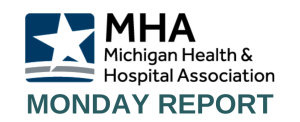
 Senate Health Policy Chair Presents to Legislative Policy Panel
Senate Health Policy Chair Presents to Legislative Policy Panel
The MHA Legislative Policy Panel met Jan. 24 to develop recommendations for the MHA Board of Trustees on legislative initiatives impacting Michigan hospitals. The meeting was highlighted by a presentation from Sen. Kevin Hertel (D-Saint …
Register for the MHA Behavioral Health Learning Series
The MHA is hosting a five-part webinar series to provide hospital staff with a deeper understanding of Michigan’s behavioral health system and the hospital’s role in connecting patients with care. These webinars are part of …
Peters Featured on WJR Live from Lansing Broadcast
MHA CEO Brian Peters appeared on Detroit’s WJR 760 AM’s JR’ Morning with Guy Gordon, Jamie Edmonds, and Lloyd Jackson’s “Live from Lansing” broadcast Jan. 25 as part of the station’s annual coverage of legislative …
Latest AHA Trustee Insights Outlines the Board’s Role in Safety and Workforce
The January edition of Trustee Insights, the monthly digital package from the American Hospital Association (AHA), includes articles on quality, safety and workforce. As healthcare becomes more complex, boards struggle to effectively oversee quality, and the …
Three Key Takeaways from Michigan’s Social Determinants of Health Summit
In my role as Maternal Infant Health Policy Specialist at the MHA, one of my main goals has been to utilize my expertise to inspire health equity for marginalized birthing persons and their children and to build relationships that strengthen my impact and purpose. Attending the second annual …
The Keckley Report
 The Holy War between Health Insurers and Hospitals: Intensifying but No End in Sight
The Holy War between Health Insurers and Hospitals: Intensifying but No End in Sight
“Last Wednesday, FTI released its year-end 2023 summary of insurer-hospital disputes: it reported a 69% increase from 2022 in conflicts where formal negotiations broke down reached based on media coverage in 34 states. The majority of the 86 instances involved Medicare Advantage coverage or reimbursement issues and referral relationships with doctors and hospitals were disrupted, at least temporarily. …
The challenges facing the health system—accessibility, affordability, effectiveness– cut across every sector. They’ll not be solved by one acting alone. And sacred cows protected by both will need to be slaughtered to create the better new normal desired by a significant majority of taxpayers and elected officials. …”

 Senate Health Policy Chair Presents to Legislative Policy Panel
Senate Health Policy Chair Presents to Legislative Policy Panel


